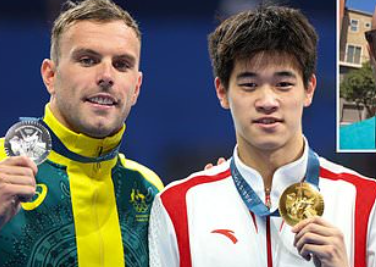Just like the old Soviet Union, China is playing their doping games in order to get their athletes more medals and showcase the Chinese Communist system.
China’s Pan Zhanle recently dominated the men’s 100-meter freestyle at the Paris Olympics, smashing his own world record. Pan’s victory was particularly significant for Chinese fans due to the extensive drug testing Chinese swimmers have faced, stemming from past doping allegations. These tests, which international officials say have been more frequent than for other competitors, are believed by some to affect the athletes’ performance.
Chinese swimmer Pan Zhanle’s record-breaking gold mired in controversy https://t.co/aauFvzOQ6o #Entertainment #sports #Olympics #ParisOlympics (video) #China #Asia #Swimming pic.twitter.com/zVNbW8EkJk
— Tech Junkie (@techjunkiejh) August 2, 2024
The Chinese swimming team has been under scrutiny since The New York Times reported in April that 23 swimmers tested positive for a banned heart drug before the 2021 Tokyo Games, though they were cleared by the China Anti-Doping Agency, which blamed contaminated food. While global authorities accepted these conclusions, the lack of public disclosure and the participation of 11 of these swimmers in the Paris Games have cast a shadow over the event.
This situation has led to a diplomatic spat involving the U.S., China, the International Olympic Committee (IOC), and the World Anti-Doping Agency (WADA). WADA has criticized the politicization of Chinese swimming and stated it has been unfairly caught in geopolitical tensions.
Historical context plays a significant role in this controversy. The revelations of Russia’s state-sponsored doping program during the 2014 Sochi Games have left lingering distrust, and some argue that global authorities may be lenient with China. However, China contends that its athletes are subjected to an excessive number of drug tests, disrupting their training and competition schedules.
World Aquatics, the international governing body for swimming, noted that Chinese swimmers in Paris have been tested an average of 21 times this year, compared to six times for American swimmers. The aim, according to experts, is to restore trust in the system by increasing testing frequency for athletes under suspicion.
The controversy has not only impacted the testing regime but also the interpersonal dynamics between athletes. Pan Zhanle mentioned feeling a cold reception from American and Australian swimmers. His win, China’s first gold in swimming in Paris, was met with skepticism from some quarters, with accusations that his performance was “not humanly possible.”
Despite these challenges, Chinese swimmers continue to compete under stringent testing conditions, which are part of efforts to ensure a level playing field. However, this has sparked a broader debate on the fairness and impact of such rigorous testing on athletes from different countries.
Chinese swimmer Pan Zhanle’s record-breaking gold mired in controversy https://t.co/aauFvzOQ6o #Entertainment #sports #Olympics #ParisOlympics (video) #China #Asia #Swimming pic.twitter.com/zVNbW8EkJk
— Tech Junkie (@techjunkiejh) August 2, 2024
The U.S. has responded to these doping issues with legislative measures. The FBI and the Justice Department have opened a criminal investigation into how Chinese swimmers avoided sanctions under a 2020 law giving the U.S. jurisdiction over global doping matters. This move has been criticized by WADA and other global officials as an overreach.
Meanwhile, Chinese state media and social media have been vocal in defending their athletes, accusing international bodies of bias and unfair treatment. The debate continues as the world watches how these issues unfold in the ongoing and future Olympic competitions.
Key Points:
i. Pan Zhanle’s Victory: Chinese swimmer Pan Zhanle broke his own world record in the men’s 100-meter freestyle, winning gold and drawing attention due to past doping allegations against Chinese swimmers.
ii. Frequent Testing: Chinese swimmers are subject to more frequent drug tests compared to their international counterparts, leading to disruptions in their performance and allegations of unfair treatment.
iii. Past Doping Allegations: Reports of 23 Chinese swimmers testing positive for a banned substance before the 2021 Tokyo Games have fueled skepticism, despite global authorities accepting China’s explanations.
iv. Diplomatic Tensions: The doping controversy has caused diplomatic tensions between the U.S., China, and international sports bodies, with accusations of political bias and unfair testing practices.
v. Impact on Athletes: Chinese swimmers, including Pan, have reported a chilly reception from foreign competitors, highlighting the broader impact of doping allegations on international sportsmanship and athlete relations.
Conner T – Reprinted with permission of Whatfinger News



